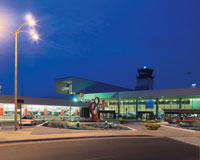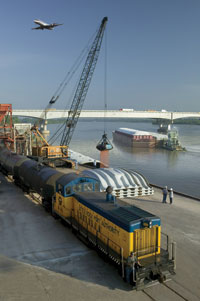 Known the world over as “The Natural State,” Arkansas is the natural choice for business. Their dedicated workforce, competitive incentives, attractive cost-of-living, research, training, distribution infrastructure and valuable partnerships have propelled the state as a natural for manufacturing, distribution and logistics.
Known the world over as “The Natural State,” Arkansas is the natural choice for business. Their dedicated workforce, competitive incentives, attractive cost-of-living, research, training, distribution infrastructure and valuable partnerships have propelled the state as a natural for manufacturing, distribution and logistics.
It’s why companies such as LM Glasfiber, Nucor Steel and J.B. Hunt have found success in Arkansas. In fact, manufacturing – and distribution – continues to play a vital role in Arkansas’s economy. A skilled workforce is readily at hand thanks to their 44 institutions of higher learning, including the University of Arkansas, which offers a bachelor’s degree in Transportation and Logistics.
Arkansas’s comprehensive transportation network and central U.S. location position the state as a strategic distribution center. Located within 500 miles of 26 states, Arkansas is the nation’s logistics capital and is a mid-point for North American trade. It is crisscrossed with interstate highways, river navigation, air and rail. This advantage will be further reinforced with the proposed Interstates 49 and69.
The Path to Arkansas
Because of Arkansas’s central U.S. location, businesses are in a prime position for transporting goods to both domestic and international markets.
Both the Little Rock and Memphis Metropolitan Statistical Areas (MSAs) were recognized by LogisticsToday magazine as among the ‘Top 50 Logistics Friendly’ cities with five-star rankings. In addition, Fayetteville’s transportation and warehousing workforce ranked in the top five nationally.
 A major interstate reconstruction was authorized by a $575 million bond issue in 1999. The bonds, combined with other available funds, have totaled more than $1 billion. In addition, the completion of the Northwest Arkansas Regional Airport offers commercial airline service, and the redevelopment of the Arkansas Aeroplex (former Eaker Air Force Base) at Blytheville offers fiber optic technology and 1.5 million square feet of available facilities in eastern Arkansas.
A major interstate reconstruction was authorized by a $575 million bond issue in 1999. The bonds, combined with other available funds, have totaled more than $1 billion. In addition, the completion of the Northwest Arkansas Regional Airport offers commercial airline service, and the redevelopment of the Arkansas Aeroplex (former Eaker Air Force Base) at Blytheville offers fiber optic technology and 1.5 million square feet of available facilities in eastern Arkansas.
Manufactured goods are transported efficiently through more than 1,600 for-hire motor carriers with Arkansas-based interstate operations. There is easy access to national destinations via eight interstates, including Interstates 30, 40, 55, 430, 440, 530, 540 and 630.
Union Pacific’s Arkansas hub at the junction of Interstates 30 and 40 in North Little Rock is home to the company’s largest and most modern locomotive repair shop and its second-largest freight car classification yard on the system. In 1998, Union Pacific opened a state-of-the-art intermodal facility at Marion, 10 miles west of Memphis, where Interstates 40 and 55 converge. The nation’s four other Class 1 railroads are also within 10 miles of this intermodal facility.
Ports along the Arkansas and Mississippi Rivers make it easy for businesses to utilize river barge transportation.
Partnerships in Training Opportunities
Workforce development is a priority of the state’s technical colleges and institutes, which work with local business and industry to meet existing and new workforce needs. More than 95 percent of the state’s population lives within a 30-mile radius of one of these institutions.
The Training and Quality Management Division of the Arkansas Economic Development Commission (AEDC) offers two customized training programs to meet the needs of Arkansas’s new, expanding, and existing businesses and industries.
The Business and Industry Training Program (BITP) is a flexible program designed for new and expanding business and industry. BITP helps these companies with recruiting workers, pre-employment training, on-the-job training, and train-the-trainer. The program also provides training assistance for existing businesses with new technology needs.
Competitive Funding Options New and expanding businesses can access a wide variety of state and federal sources for start-ups and expansions in Arkansas.
New and expanding businesses can access a wide variety of state and federal sources for start-ups and expansions in Arkansas.
To provide competitive financing for manufacturers, Industrial Revenue Bonds (IRBs) are underwritten on the financial strength of the company or guaranteed by the Arkansas Economic Development Commission or the Arkansas Development Finance Authority.
Taxable IRBs may be used for distribution facilities and business headquarters at long-term rates and for manufacturing projects that exceed $10 million in capital costs or do not meet other federal guidelines relative to tax-exempt bond financing.
Businesses that use either tax-exempt or taxable industrial revenue bond financing can negotiate with the local community for a payment in lieu of property taxes.
Arkansas’s Bond Guaranty Program complements the IRBs, guaranteeing timely payment of principal per bond issue, to the bondholders. This guaranty gives the bonds a better rating, thereby making the bonds more attractive to investors and reducing the company’s cost to borrow money.
A business can obtain up to $11 million per project by combining the AEDC bond guaranty with the $6 million guaranty offered by the Arkansas Development Finance Authority (ADFA). ADFA can also issue bonds for projects on a pooled basis and provide short-term financing to a company before bond proceeds are available.
Success in Plastics
Arkansas is the ideal location to foster growth in the plastics industry. Anchor Packaging is just one such example of a company discovering the benefits of doing business in Arkansas. The company is undergoing a major expansion of its facility in Paragould (northeast Arkansas) to improve production of its products for the restaurant, supermarket and food processing industry. The expansion houses eight new, state-of-the-art inline thermoforming machines, which produce take-out containers for prepared foods sold in retail, foodservice and food processing markets.
Metals
The metals industry in Arkansas continues to be red hot. The Western Hemisphere’s largest structural steel mill is located in Northeast Arkansas. Arkansas is a leader in recycled steel production, with an annual capacity of more than 670,000 tons. The steel sector is projected to grow by 50 percent in Arkansas by the year 2014.
Earlier this year, Boyd Metals broke ground on a new manufacturing and distribution facility in Little Rock. The facility is designed to easily accommodate future expansions as needed.
PIZO Operating Company recently broke ground on a new facility in Blytheville. The company will process electric arc furnace dust from area steel plants, converting it into marketable products used primarily in the metals industry.
Incentives
Arkansas voters overwhelmingly approved an amendment to the state constitution that will help attract super projects. The state can now issue general obligation bonds to build infrastructure, such as rail, roads and water lines. The maximum amount of bonds that can be issued is equal to 5 percent of state general revenues during the most recent year.
Arkansas’s incentives are based on payroll instead of number of jobs and are determined according to location. Arkansas’s basic incentives are:
Advantage Arkansas (income tax credit)
Tax Back (sales and use tax refund)
InvestArk (sales and use tax credit)
Research and Development (income tax credit)
Targeted Businesses (transferable income tax credit; sales and use tax refund)
Customized Training Incentives
For information on doing business in Arkansas, please visit the Arkansas Economic Development Commission website: www.ArkansasEDC.com.

